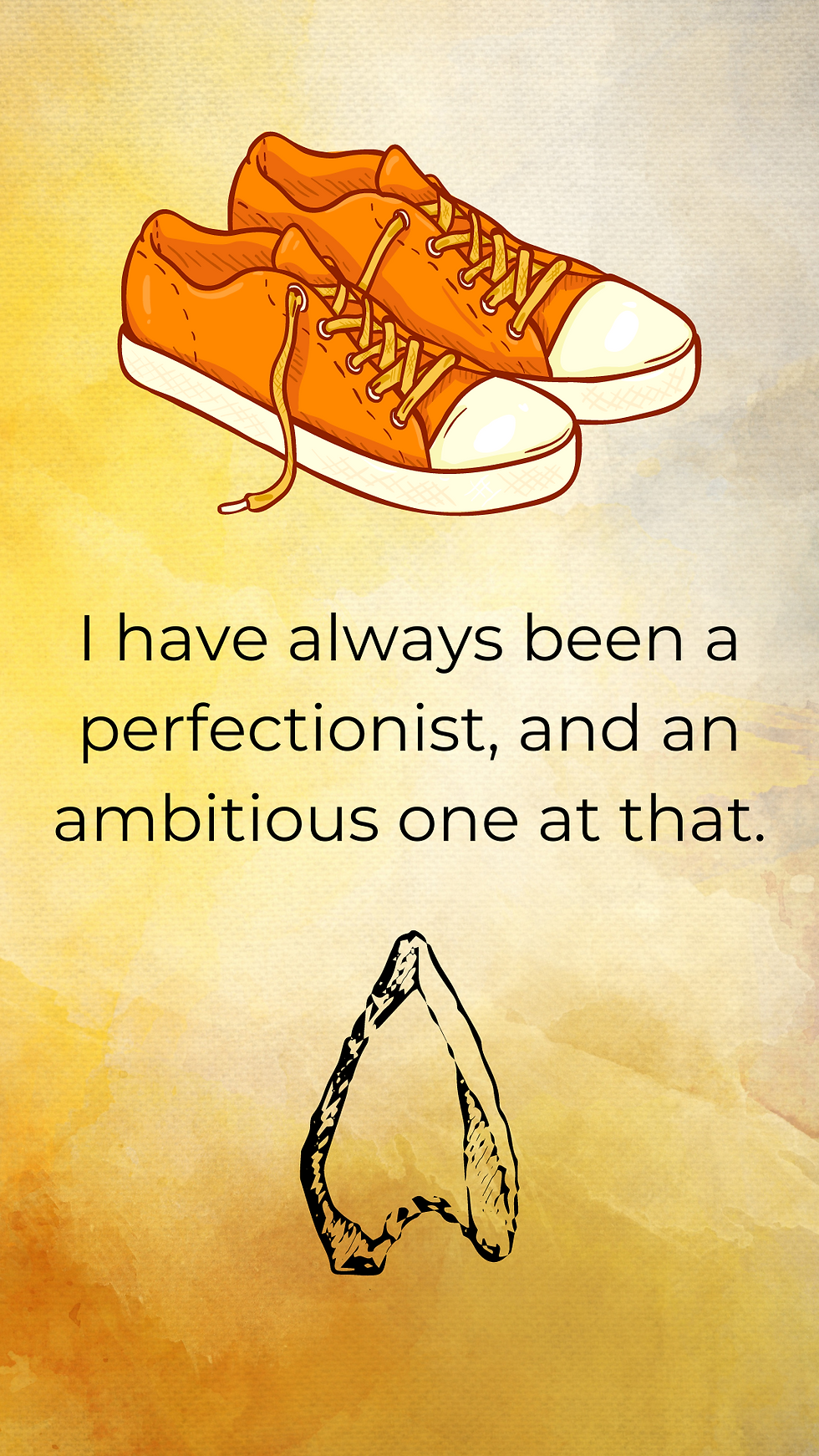Shoelaces and Straight As - How an Obsession with Productivity Ruins and Saves Me
- Lauren C. Sergeant

- Feb 14, 2023
- 6 min read
Updated: May 14, 2023
I have a problem—I am obsessed with productivity.

In my mind, I must account for every waking minute with what I accomplished that day. A plethora of anxious, stressful thoughts assaults me as a result. When I lie down to sleep, I do so in absolute exhaustion but unable to rest—I wasn’t productive enough. Every night, I run through the list of tasks I completed and find myself lacking. Where does this mentality come from? How can I remedy it?
I have always been a perfectionist, and an ambitious one at that. In elementary school, I spent hours one night drawing, erasing, and redrawing a character’s shoelaces for an art project. In 6th grade, we were assigned to bring in props for a project on Native American culture. I purposed to find a stone in my backyard and grind it down into an arrowhead point to bring the next day. Thankfully, my mom stopped me before I could frustrate myself too much.

In high school, I received straight As for all four years. Though it didn’t affect my GPA, I grieved when my report card showed anything less than A+s. I took the Advanced Placement (AP) test for every class I could, and I received the top score, a 5, every time except once—for Calculus BC. My school didn’t even offer a class for Calculus BC, so I was basing my knowledge on some tips from our Calculus AB teacher and a few hours of self-study. I received a 4 on the test, well above passing, yet it wounded me that I had broken my streak of “perfection.”

I think my desire for productivity stems in part from my desire for perfection. I want zero waste in terms of time. If I could record every minute of every day and assign each to a significant task, something tells me this would bring me fulfillment. For this reason, I’m a fan of to-do lists and checklists, and I obsess over time tracking. I would be delighted to have data analytics on my productivity and time use. It’s like finding out what I could from such data would let me in on a life-changing secret and help me rebalance my life to find greater peace and satisfaction. Part of me believes if I could only strike a balance in routine and accomplish everything “important” each day, I would rest easy each night. Anxiety would flee. Stress would diminish to a manageable level.
Is that true, though? It seems like the more I do, the more inadequate I feel. In 2019, I wrote four books in eleven months, worked a full-time job, took care of my family, spent time with friends every week, and released my first published novel. Yet I wondered why I hadn’t written the fifth and final book of the series in that time. One weekend, I wrote 11,000 words (~40 book pages) in 24 hours, hardly sleeping. Yet I wondered why I hadn’t finished writing the next few chapters as well. If only I used my time more wisely and efficiently, I often think to myself, then I would feel satisfied. But is that really it?
Or am I substituting productivity and perfectionism for my sense of worth? Another way of phrasing my mental paradigm is that if I accomplish what I think I should accomplish, then I would feel like a worthwhile human being. I would be a worthwhile human being.

The problem is, what I think I should accomplish is constantly changing, growing more demanding with each check mark on the to-do list. I might start out with a goal of writing 1,000 words one day, but once I have written them all, instead of relaxing and celebrating, I extend the goal out to 1,500 words. It’s just 500 more words, and clearly I can do it since I just wrote 1,000 words. I might even reach the 1,500-word goal after that, at which point I pull the rug from beneath myself again and set the goal at 2,000 words. I create an impossible situation for myself, and by equating my accomplishments with my worth, I ensure I always fall short.
I am never enough. There have been times I have found myself one of the most intelligent or accomplished or popular individuals in a room, but no matter how I compare to those around me, I know I am deficient. I am not measuring myself against others but against an even more stringent standard—that of perfection. I will never attain such a standard because I have already failed its test. To be perfect is to be without error—past, present, and future. Because I have failed in the past, I have already disqualified myself. Each present and future failure just reinforces that truth with searing pain, branding me, “Imperfect.” Perfectionism has taught me I will never be enough.

The world might compassionately (but erroneously) try to persuade me I am enough. Some Christians will quote Psalm 139 and tell me I am “fearfully and wonderfully made.” They are not wrong, but they do not see the issue for what it is. I do not need convinced of my intrinsic value as a creature formed by the hands of God. Rather, I am struggling that, as such a creature, I have marred God’s perfection and will continue to do so for as long as I live in this broken world. Wasting time might not be called out as a sin in the Bible, but misplacing priorities and idolizing things not God are transgressions of God’s good order. Looking through Facebook is not an offense in and of itself. However, when I have the energy and choice to read God’s Word or to follow pointless debates on social media and I spend an hour ignoring the former to scroll through the latter, I demonstrate my preference for gossip over God. With decisions as seemingly insignificant as these, I dishonor God and bring disgrace upon myself.

If self-affirmations and Biblical reminders of my intrinsic worth are not satisfactory answers to my shortcomings, what is? What can stand against my failures? Even if I were able to have one perfect day, I have had a thousand imperfect days to swallow up that victory. As hard as I try, I could never make up for all the wrongs I have wrought. On my own, my situation is hopeless.
Thanks be to God, I’m not on my own! Praise Him, for He made a way for me! By another’s perfection, I am made perfect. By another’s righteousness, my sin and death are swallowed up in victory. My record is clean, my past forgiven. I am not sinless, but by another’s death, I have life. The Light of the world dwells in me, illuminating me from within so that I shine with new purpose. My worth is not in my accomplishments but in the life laid down to redeem me from my paltry offering of “good deeds.” Keith and Kristyn Getty have a song that proclaims this clearly:
My worth is not in skill or name, In win or lose, in pride or shame, But in the blood of Christ that flowed At the cross.
I rejoice in my redeemer, Greatest treasure, Wellspring of my soul, And I will trust in him, no other; My soul is satisfied in him alone.

My redeemer determined my worth by His sacrifice long before I could hope to earn it. He is my greatest treasure, the wellspring of life flowing from inside me as His Spirit indwells me. I must and will trust in Him for my satisfaction and fulfillment, as only He can bring renewal to a spirit broken by unfinished to-do lists and the curse of imperfection.
Two wonders here that I confess: My worth and my unworthiness, My value fixed, my ransom paid At the cross.
I remain unworthy—I cannot erase my past errors, and I am bound to make more in the future—but Jesus has placed infinite worth on my soul. Tension lives within me as a result. I am always striving to honor the blood shed for my redemption, pursuing righteousness to that end. At the same time, every one of my failings reminds me of the incredible value of knowing and having such a Savior.

I have a problem—I am obsessed with productivity. However, I wouldn’t change it. It is truly a struggle. I frequently feel deficient and despondent as I review my daily accomplishments or lack thereof. However, every time I fall short, I have the opportunity to remember where my real worth lies. Imagine a world in which I could check off everything on my to-do list every day—would I even be aware I need saving? In a world of plenty—enough food for every meal, enough clothes for weeks, a vehicle and enough gas money to get me everywhere I need to go, enough income to make a mortgage and utility payments every month—if I weren’t deficient in some way, would there be any room for me to wonder about my need for God? This struggle that leaves me ashamed and despairing at times, perhaps it is God’s mercy toward me to draw me to Him. Maybe the answer to my problem is not refraining from making checklists and goals. It might be I don’t need to flee my desire to do many things well. Maybe it’s just a matter of knowing I will fail, and when I fail, knowing where my hope truly lies.




Comments